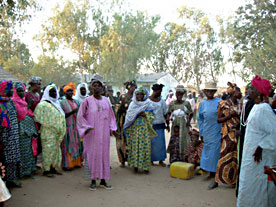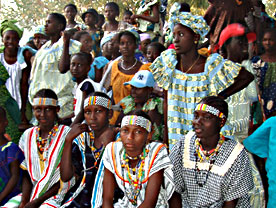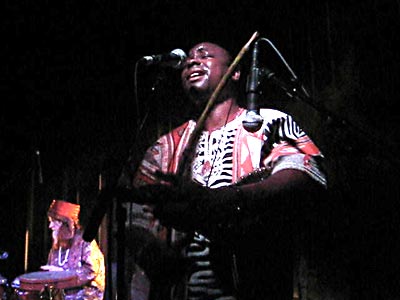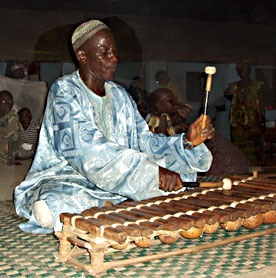|
|||||||||||||||||||||||||||
Gambian culture
Culture constitutes the way of life of a people. It is a by-product of a relation between people and a society speaks out through its culture. Culture gives expression to the social thought, beliefs and values of human beings. A society which has no culture would be composed of persons who are expressionless. Cultural tools, like songs, dances, drama, have been utilised as coping mechanisms to prevent total social disintegration. This has been the strength of many African societies. The sense of community has served as a welfare system for many African societies where the old, the disabled and children are given protection. Even though poverty increases dependency and causes strain to the providers, without the sense of community the weight of poverty would be much heavier. The Gambia is a multi ethnic and multi cultural society. There is no area in the Gambia which is entirely habited by one ethnic group. The ethnic groups are closely knit together by cohabitation and therefore, there is a certain cultural symbiosis among them.
In that regard there is a tendency towards the establishment of a Gambian National Culture, which will be a sum total of all the ethnic cultures. For instance the Gambia National Troupe is composed of all the ethnic groups and their musical repertoire is drawn from all the ethnic groups. The members of the troupe are capable of singing songs from each ethnic group and equally capable of dancing them.
|
|||||||||||||||||||||||||||
|
Demba Conta - yen yen |
Most of these Gambian artists are young high school leavers, who have found a legitimate formula to unemployment, a problem slowly gripping this largely tourism steered economy. Some are still going to school though while sparing time to be part of the music revolution.
Presently, there are over 40 groups in the Gambia. Few have so far produced albums. The rest already have enough lyrics to compose albums but do not have the necessary cash to finance the basic stages of mixing and recording, which, in local Gambian studios could go up to US $5,000. As a temporary measure however, groups with shaky financial situations have resorted to producing audio singles and video clips simultaneously raising funds before heading for the studios.
At least, Gambians can now express a sigh of relief that after years of inactivity, life is now being injected to the music scene resulting in the frequent composition of lyrics that could be exhibited at any international festival.
Links to some Gambian Musicians on the WWW
- Basirou Suso - Gambian kora musician in Denmark
- Black Nature - Gambia's Musical coruscate
- Buba Jammeh and his Barawulo Band
- Dance Hall Masters - Gambia's Best New Group 1999
- Foday Musa Suso Gambia's internationally recognized musician and a griot (musician/oral historian of the Mandingo people)
- Ifang Bondi - is considered to be one of West Africa's leading and most innovative groups
- Jaliba Kuyateh and The Kumareh band of The Gambia
- MC Omar - a Gambian Musician in Finland
- XamXam - Musa Mboob and Ousman Biyai
Dawda Jobarteh and Band Live at Copenhagen Couleur Café 2013 - Bamba Bojang
Historic sites
The Stone circles of The Gambia
Some Gambian Organisations

A new rising star - Eddie Conta, son of Demba Conta
Events

Related Websites
- Mandinka.org Mandinka kang folaalu la bundaa
- The Art of Momodou Ceesay - A gifted Gambian artist with International recognition
- Lonely Planet World Guide |Africa
- MANSA - The Mande Studies Association is a multidisplinary group with interests in the Mande region of West Africa.
- N'Ko - The Common Language of the Mandens
- Languages of Gambia - List of languages of Gambia
- Fula Flute CD- Song Notes and mp3s
- Bob Marley Reggae legend tribute
- Rumba-Kali- Home of African Hip Hop

Juldeh Camara in Copenhagen - May 2008
This page is owned and maintained by Momodou Camara
Jali Foday Musa Suso - Jarabijeh

Baba Galleh Jallow

Baba Galleh Jallow

Historic Sites of the Gambia - An official Guide to the monuments
and sites of The Gambia.

Patience Sonko-Godwin
Social and Political Structures in the Precolonial Periods
(Ethnic Groups of The Senegambia Region)
![]()
![]() Home- Back to start page
Home- Back to start page![]()
![]()
1996-2023 Nijii, All rights reserved. Momodou Camara



